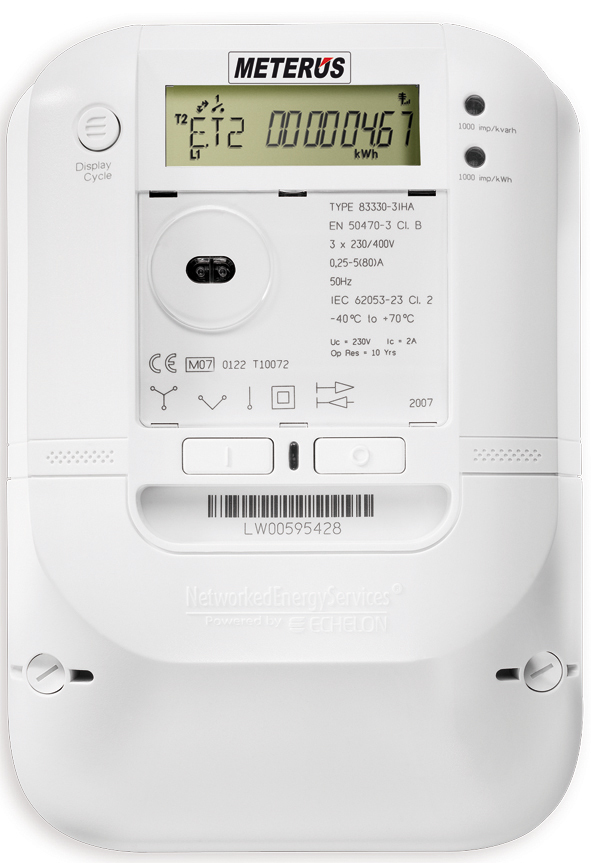A third-party analysis commissioned by the Illinois-based Commonwealth Edison Company estimates the company’s 5.4 million Illinois utility customers could save $2.8 billion on electric bills over a 20-year period if smart meters are implemented. The study concludes these significant savings would be in addition to cost reductions achieved by customers who employ the meters to manage energy use in their homes and businesses.
“Advanced Metering Infrastructure Evaluation Final Report”—conducted by consultancy firm Black & Veatch and released in July—was commissioned by ComEd to evaluate a one-year pilot program for smart meters approved by the Illinois Commerce Commission.
The Black & Veatch report bolsters ComEd’s support for Illinois’ Energy Infrastructure Modernization Act (SB 1652). According to the Wall Street Journal, SB 1652 “would authorize a multi-billion investment in modernizing Illinois’ electric grid while maintaining strict regulatory oversight and consumer protections.”
“Over the 20-year evaluation period, assuming a five-year meter deployment scenario, ComEd would expect to invest $996 million in new capital and incur $665 million of operational costs to run the system,” reads the report’s Executive Summary.
“Cumulative benefits over the 20-year evaluation period, however, significantly exceed cumulative costs by a factor of almost three,” the report continues. “Benefits result from improved operational efficiencies ($1,625 million), reduced power purchase costs ($707 million), reduction in bad debt expenses ($791 million), new energy revenues ($1,051 million), and new delivery service revenues ($564 million). A large majority of these benefits are driven by reductions in theft and tamper conditions and reductions in consumption on inactive accounts.”
Subtracting the costs from these benefits provides the $2.8 billion in savings cited by ComEd.
Governor’s Veto Expected
SB 1652 passed both chambers of the Illinois General Assembly this past May, but Gov. Pat Quinn, a Democrat, is expected to veto it because of concerns ComEd would be given a “blank check to spend billions of dollars at the expense of the hard-working men and women of our state,” as he wrote in a May 29, 2011 joint statement with Illinois Attorney General Lisa Madigan. “They should justify their multi-billion dollar investment plans before consumers are on the hook to pay for them.”
If the bill survives the governor’s veto, installation of smart meters would begin in 2012 and continue through 2021.
Proponents of the bill claim ComEd customers will save even more money by participating in pricing option programs and monitoring their use during peak hours using smart meter digital technology.
More Timely Responses
ComEd says smart grid technology would’ve restored electricity more quickly following massive power outages more than 850,000 Illinois residents experienced after a July 11 storm this year downed power lines and utility poles, because it could have dispatched service crews in a more timely fashion. Additionally, digital technology might have diagnosed between 100,000 to 175,000 outages before they occurred, and triggered an automated system to make necessary technical corrections or reroute power.
Pat Hemlepp, director of corporate and media relations for American Electric Power, says smart meter and smart grid programs “allow customers to experience greater control of energy usage, enhanced energy conservative opportunities, increased energy efficiency, improved customer services including expanded offerings, and greater service and reliability.”
Hemlepp says smart meter technology also allows companies to better combat energy theft, the cost of which is ultimately borne by all consumers.
Consumer Choice, Flexibility
Customers are not the only ones who benefit directly from smart metering. Scott Simons, a DTE Energy media relations representative in southeast Michigan, says his company already has recognized increased efficiencies following the installation of smart meters.
“We have installed 400,000 meters so far. When we hit the 250,000 meter install mark, we had already automated 500 meter reading routes,” Simon said. “In addition, more than 8,000 field visits had been avoided [thanks] to the remote connect and disconnect capabilities of the meters. We will be able to detect problems on the electric system to the meter, so when problems do occur, we’ll know how best to respond.”
Simon says the main benefit of smart meters for utility companies is in automating meter routes and avoiding service visits through the ability to remotely control the meters. This cuts operational costs, avoids physical trips by employees, reduces the number of trucks needed for services, lowers insurance and fuel costs for these trucks, and enables quicker repair of power outages.
“The meters will lead to a real-world test of Smart Home concepts, technology, and customer acceptance to assess its potential as a platform to promote energy management, customer control, choice, and flexibility,” said Simon. “It will enable us to offer new pricing and billing options, including prepay billing. It will virtually eliminate estimated bills and allow us to remotely connect and disconnect service, providing greater convenience for our customers,” he added.
“Converging factors, including rising energy prices, less costly advanced communication and control technologies, environmental considerations, the need to update the distribution infrastructure, and rising customer expectations as to quality of service, make the timing right for these advances,” said Hemlepp.
Kyle McGrath ([email protected]) writes from Waterford, Michigan. Bruce Edward Walker ([email protected]) is managing editor of Infotech & Telecom News.
Internet Info
“Power-Upgrade Plans Spark Illinois Storm: State Leaders, Consumer Advocates Say Proposed Changes to Prevent Outages Would Be Too Lucrative for Two Utilities,” Rebecca Smith, Wall Street Journal, August 8, 2011: http://online.wsj.com/article/SB10001424053111903885604576488512668810974.html
“Gov Quinn Renews Pledge to Veto SB-1652, the ‘ComEd’ Bill on Rate Increases,” Illinois Gov. Pat Quinn and Attorney General Lisa Madigan Joint Statement on SB 1652, May 29, 2011: http://illinoischannel.blogspot.com/2011/05/gov-quinn-renews-pledge-to-veto-sb-1652.html
“Advanced Metering Infrastructure Evaluation Final Report” Black & Veatch study, July 2011: http://www.smartenergyil.com/sites/default/files/resources/smart_meter_full_evaluation.pdf





